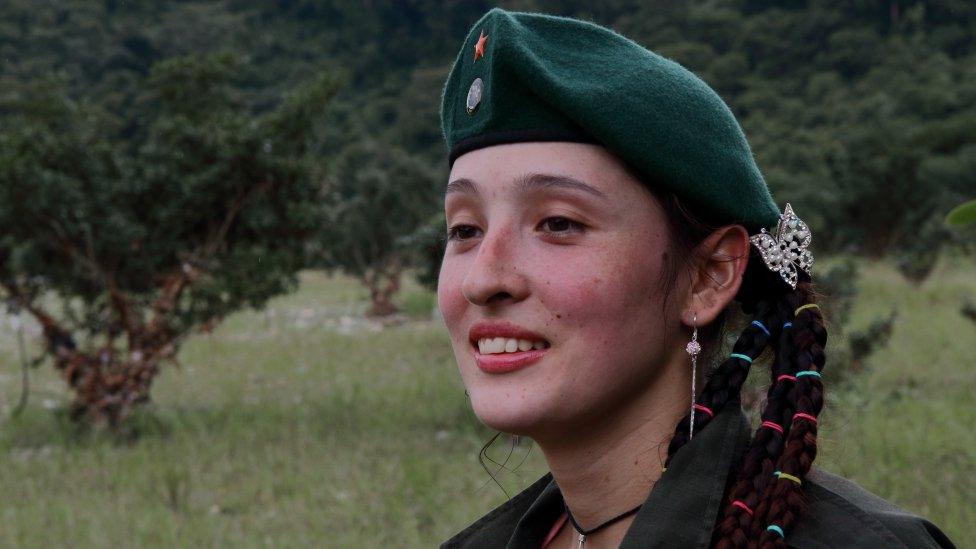Colombians celebrate as peace deal is reached with Farc rebels
- Published
The BBC's Natalio Cosoy says that there are still some Colombians who are wary of the new peace deal
Hundreds of Colombians have celebrated an historic peace accord between the government and left-wing Farc rebels, signed after 52 years of conflict.
The announcement was broadcast live on Wednesday from Havana, Cuba, where peace talks have been held for almost four years.
The conflict has killed an estimated 260,000 people and displaced millions.
President Juan Manuel Santos called the deal "the beginning of the end to the suffering, pain and tragedy of war".
'War is over'
"The Colombian government and the Farc announce that we have reached a final, full and definitive accord," Colombian government and Farc negotiators said in a joint statement.
The head of the Colombian delegation, Humberto de la Calle, and the chief Farc negotiator, Ivan Marquez, signed the agreement at a ceremony in Cuba.
Both sides have agreed to work together to address social exclusion, to deliver justice to the victims of the conflict and build a stable and enduring peace.
The agreement comes after two years of secret talks and almost four years of formal negotiations.
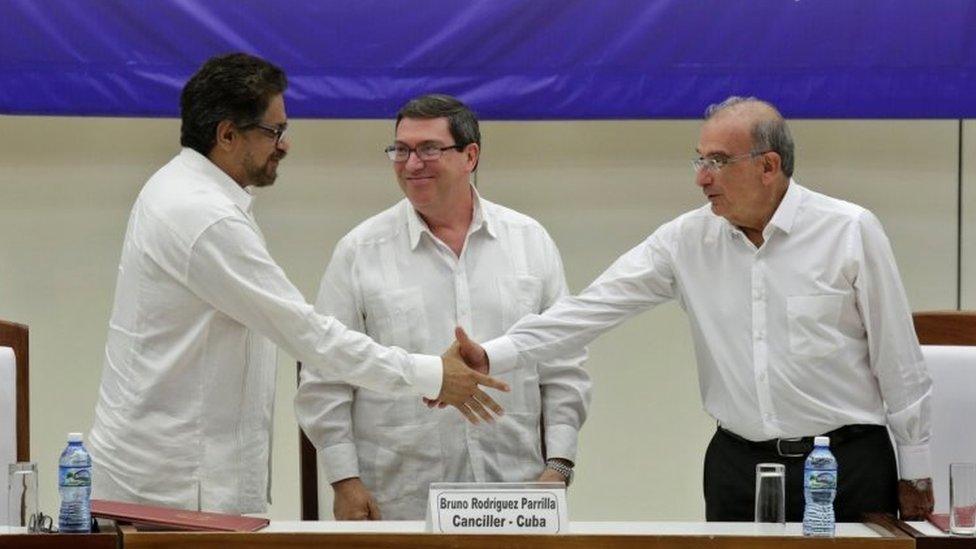
Colombian government negotiator Humberto de la Calle (right) and his Farc counterpart Ivan Marquez (left) signed the agreement as Cuban Foreign Minister Bruno Rodriguez watched
"We have reached our goal," said Mr de la Calle.
"The war is over but also there is also new beginning. This agreement opens the door to a more inclusive society," he added.
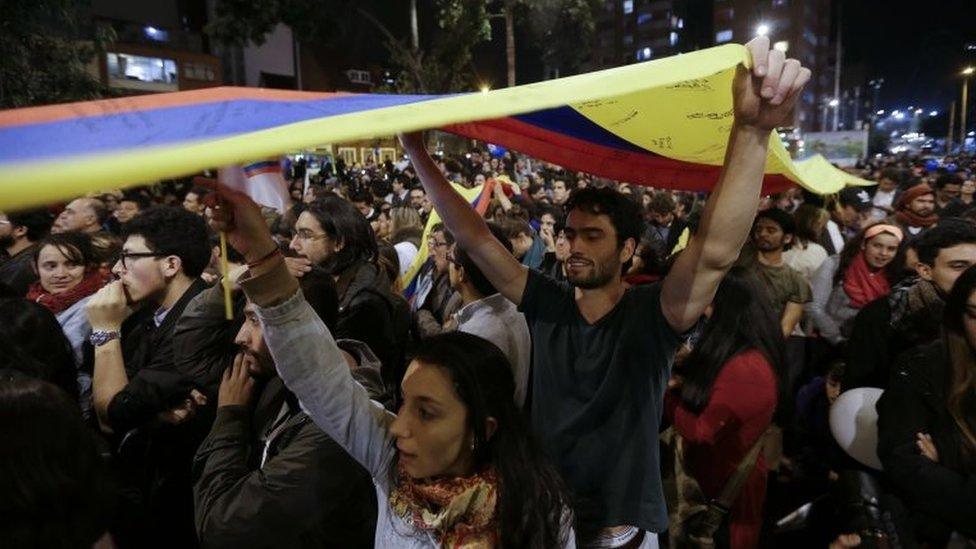
The announcement was broadcast live from Havana and was shown on large screens in the streets of Bogota
'Die in peace'
In Bogota, hundreds of people, many dressed in white, gathered at different points of the city waving the Colombian flag and cheering.
"I can die in peace because finally I'll see my country without violence with a future for my children," 57-year-old Orlando Guevara told the Associated Press news agency.
Farc negotiator Ivan Marquez said the Farc and the government had "won the most beautiful of all battles: the peace of Colombia".

Good news or coup against justice? Colombian ex-leaders react

Most major dailies in Colombia backed the deal in their lead editorials.
Centre-right El Espectador praised the government's "bet on a structured, calm negotiation, with enough time for thought" while centre-left daily El Heraldo considered it "a historical step" that has the chance of "transforming the country".
Among those who commented were three former Colombian presidents.
Alvaro Uribe criticised the deal, saying it would promote "impunity" and expressed doubts as to whether the rebels - who financed themselves to a large extent by cocaine smuggling - would ever face drug trafficking charges.
Andres Pastrana, who tried and failed to reach a deal with the Farc while he was in office, said the agreement was "a coup d'etat against justice".
But Ernesto Samper, who is now secretary general of regional body Unasur, praised the deal as "good news" for Colombia and the region as a whole.
BBC Monitoring reports and analyses news from TV, radio, web and print media around the world.

The two sides had signed a bilateral ceasefire in June, paving the way for a final agreement.
"It has been a difficult job, with bright and dark moments," added Mr Marquez.
The BBC's Will Grant gained access to a Farc camp in Western Colombia
President Barack Obama phoned his Colombian counterpart, Juan Manuel Santos, to congratulate him on the deal.
"The president recognised this historic day as a critical juncture in what will be a long process to fully implement a just and lasting peace agreement that can advance security and prosperity for the Colombian people," said the White House in a statement.
'No winners or losers'
Under the terms of the agreement, the Farc will give up its armed struggle and join the legal political process.
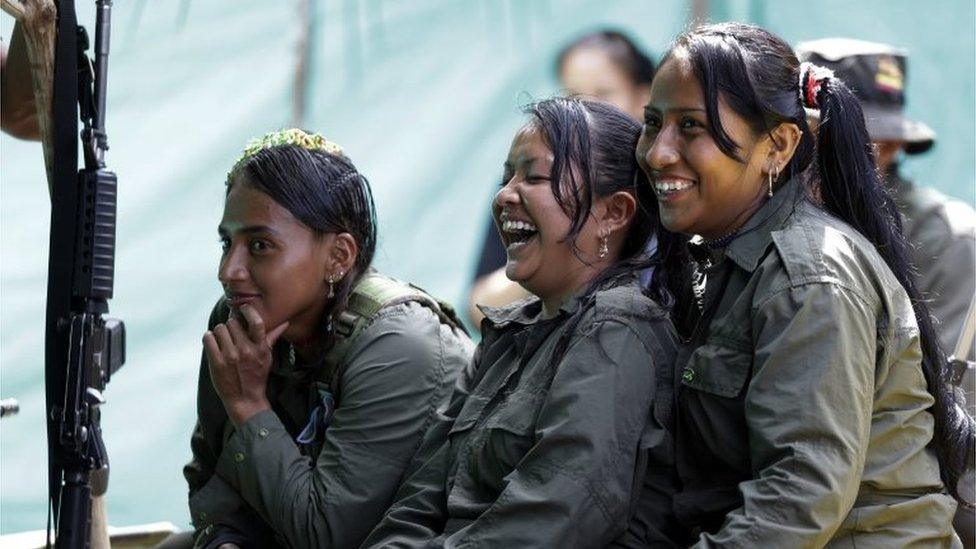
Farc fighters have agreed to end their five-decade long struggle and lay down their arms for good
"There is no room for winners or losers when you achieve peace through negotiations," tweeted Farc negotiator Rodrigo Granda. "Colombia wins, death loses."
The left-wing rebels have been fighting Colombian government since 1964. It is the longest-running conflict in Latin America.
The deal will need to be approved by Colombians in a popular vote, which will take place on 2 October, Mr Santos announced.
"It will be the most important election of our lives," he said on national television shortly after the deal was signed.
Former President Alvaro Uribe is leading the campaign to get the agreement rejected.
- Published24 June 2016
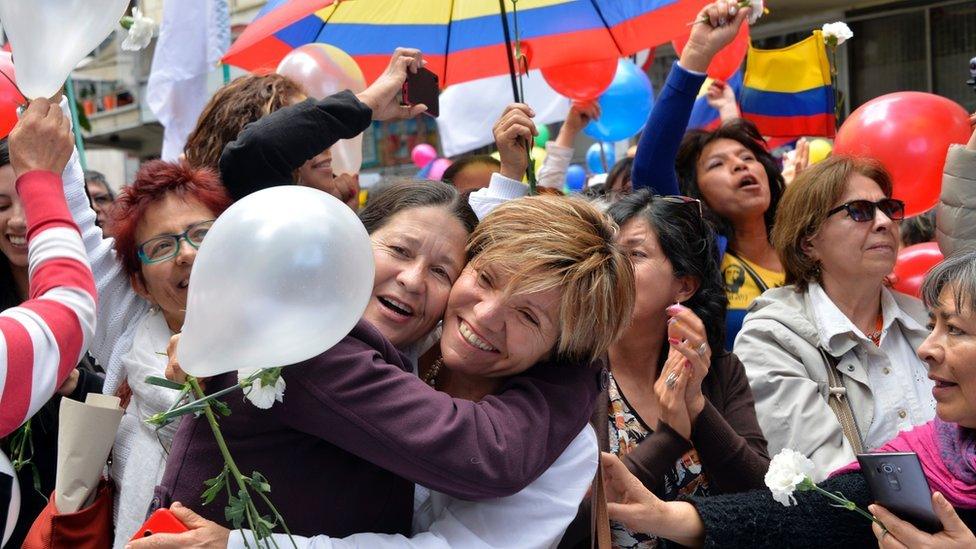
- Published23 June 2016
